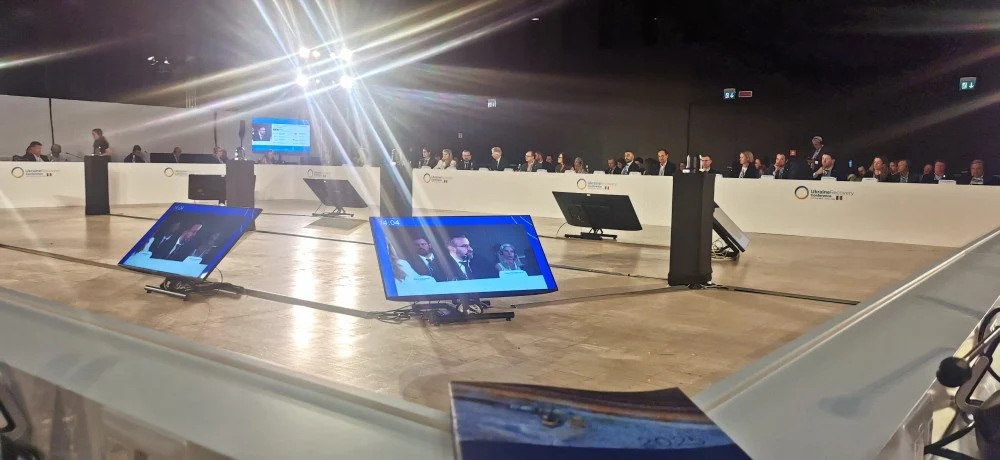Green Concerns Linger as Ukraine’s Recovery Plans Take Shape
Kyiv/Vienna
July 15, 2025
European Commission President Ursula von der Leyen speaks from the main stage at the Ukraine Recovery Conference 2025, as Ukrainian President Volodymyr Zelenskyy and other high-level delegates follow her address
At the Ukraine Recovery Conference 2025, more than 6,000 stakeholders convened to chart the country’s post-war future. Among them were WWF and other civil society members of the Build Ukraine Back Better (BUBB) platform, seizing the moment to observe, engage, and press for a recovery path that doesn’t leave the environment behind.
This year’s gathering marked a noticeable shift in tone from previous recovery forums. While past discussions were dominated by governance reforms and state support schemes, URC25 homed in on one pressing question: how to unlock private sector investment. Without it, speakers stressed, Ukraine’s recovery in sectors such as energy, transport, agriculture, and dual-use goods would stall. There was also heightened interest in exploiting critical raw materials — a prospect not without its risks.
Workshop on critical raw materials, Ukraine Recovery Conference 2025
Environmental standards at risk of being sidelined
Despite the attention on economic revival, the conference offered little assurance that the recovery will be environmentally sustainable. WWF noted with concern that the ecological dimension was scarcely addressed from the podium. A rare exception came from Margot Wallström, former European Commissioner for the Environment, who reminded delegates that environmental issues are not a luxury to be postponed until after the war. “Failure to comply with environmental standards during reconstruction,” she warned, “will exacerbate the consequences of Russia's military aggression.” Wallström underscored the deep links between environmental health and national security — a message few others seemed willing to voice.
The EU’s “Do No Significant Harm” principle, designed to guide investment in line with environmental safeguards, received minimal attention. Yet this principle is vital: without it, the very foundations of Ukraine’s recovery risk becoming environmentally destructive.
To fill that gap, the Build Ukraine Back Better platform has developed a Roadmap for Sustainable Recovery, outlining specific proposals to integrate environmental protection into reconstruction. Key recommendations around environmental impact assessments (EIA) and strategic environmental assessments (SEA) were also detailed in a recent joint report by WWF-Ukraine and the NGO Ecoclub.
Build Ukraine Back Better platform representatives at Ukraine recovery Conference 2025
A flagship fund — but will it be green?
One of the headline announcements at URC25 came from European Commission President Ursula von der Leyen: the launch of a new European flagship fund for Ukraine’s reconstruction. Backed by the European Investment Bank and governments of France, Germany, Italy, and Poland, the fund begins with €220 million in capital, aiming to mobilise €500 million by 2026.
WWF welcomed the fund’s potential but urged that it be deployed in line with environmental safeguards. Without firm commitments to best international practices, the organisation warned, such investments could undermine long-term sustainability. Ukraine’s EU accession process could prove a catalyst for aligning these investments with European standards — if both sides commit to it.
Accession hopes — and environmental obligations
European Commissioner Marta Kos praised Ukraine’s reform efforts and anticipated that all EU accession negotiation chapters would open by the end of 2025. She expressed hope that Ukraine could join the EU by December 2029. However, WWF cautioned that speed must not come at the cost of substance. Ukraine’s environmental legislation must be fully aligned with that of the EU, particularly in light of the extensive environmental damage caused by Russia’s war.
Energy transition: the role of renewables
Renewable energy emerged as a shared priority among many speakers, including Kos. A successful energy transition — essential for EU integration — will require more than lofty ambitions. Transparent regulation, innovation, investment backing, and robust risk-mitigation strategies are all needed to make renewable energy viable on the ground.
International financial institutions including the EU, EBRD, World Bank, EIB, and IRENA pledged their support in the form of funding, technical assistance, and infrastructure investment. Yet WWF stressed that green financing must not be reduced to a buzzword. For instance, any investment in new hydropower or forest biomass must be held to the highest environmental scrutiny — otherwise, the transition risks doing more harm than good.
The Missing Green Thread in Ukraine’s Recovery Debate
URC25 succeeded in rallying international support for Ukraine — a crucial achievement. But according to WWF and green civil society allies, it fell short on another front: giving environmental issues the platform they deserve. Notably, Ukraine’s own Minister of Environment was absent from most panels, as were other environmental voices.
For WWF and the BUBB platform, the message is clear. Recovery must be more than bricks and investment capital. It must be sustainable, inclusive, and rooted in a vision for a resilient future — one where the environment is not an afterthought, but a foundation.
by WWF-CEE


